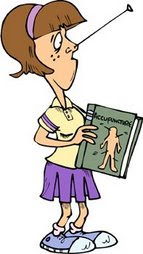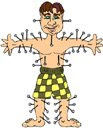This year there will be 1 billion colds and 95 million cases of the flu in the United States alone. While the misery of cold and flu season might be inevitable, one thing is changing: where we look for relief.
Acupuncture to Get Better Faster - If you have already come down with a cold or the flu, acupuncture treatments can help relieve symptoms you are currently experiencing including chills, fever, body aches, runny nose, congestion, sore throat and cough. While bringing some immediate relief, treatments will reduce the incidence of an upper respiratory tract infection and shorten the length of the illness.
Acupuncture for Prevention - Acupuncture and Oriental medicine can prevent colds and flu by strengthening the immune system with just a few needles inserted into key points along the body's energy pathways.
In Oriental Medicine, disease prevention begins with a protective layer around the exterior of the body called wei qi or defensive energy. There are acupuncture points known for strengthening the circulation of blood and energy and for consolidating the outer defense layers of the skin and muscle (Wei Qi) so that germs and viruses cannot enter through them.
If you catch colds easily, have low energy and require a long time recuperating from an illness your wei qi may be deficient.
Acupuncture Point: Du 14
One particularly important point to attend to is Du 14. Located below the spinous process of the seventh cervical vertebrae, approximately where the collar of a T-shirt sits on the neck.
Du 14 activates the circulation of blood and Qi to strengthen the outer defense layers of the skin and muscle (wei qi) so that germs and viruses cannot enter through them.
This point is often used to ward off as well as shorten the duration colds and flu.
Seasonal acupuncture treatments just four times a year also serve to tonify the inner organ systems and can correct minor annoyances before they become serious problems. Call us to see how we can help you stay healthy this season!
Seasonal changes affect the body's environment. With wind, rain and snow comes the colds, flus and the aches and pains that accompany them – Good lifestyle and hygiene habits are proven to reduce your risk of getting sick.
Wash Your Hands– Studies have shown that one of the main reasons that we catch colds and flu in cold weather is that we are indoors and in closer vicinity to others. Protect yourself by washing your hands regularly and try not to touch your face.
Sleep In - The Nei Ching, an ancient Chinese classic, advised people to go to sleep early, rest well and rise late, after the sun's rays have warmed the atmosphere a bit. This preserves your own Yang Qi for the task of warming the body.
Stress Less - Find a release valve for your stress. According to Chinese medicine, stress, frustration, and unresolved anger can play an important part in throwing the immune system off and allowing pathogens to affect the body. Find a way to relax and release stress on a daily basis. Such methods may include yoga, meditation and exercise. Acupuncture has been shown to be effective in the treatment of stress, anxiety and depression.
Seasonal Tune-Up - Acupuncture and Oriental medicine can prevent colds and flu by building up the immune system with just a few needles inserted into key points along the body’s energy pathways. These points are known for strengthening the circulation of blood and energy and for consolidating the outer defense layers of the skin and muscle (wei Qi) so that germs and viruses cannot enter through them.
Seasonal acupuncture treatments also serve to tonify the inner organ systems and correct minor annoyances before they become serious problems.
Wash Your Hands– Studies have shown that one of the main reasons that we catch colds and flu in cold weather is that we are indoors and in closer vicinity to others. Protect yourself by washing your hands regularly and try not to touch your face.
Sleep In - The Nei Ching, an ancient Chinese classic, advised people to go to sleep early, rest well and rise late, after the sun's rays have warmed the atmosphere a bit. This preserves your own Yang Qi for the task of warming the body.
Stress Less - Find a release valve for your stress. According to Chinese medicine, stress, frustration, and unresolved anger can play an important part in throwing the immune system off and allowing pathogens to affect the body. Find a way to relax and release stress on a daily basis. Such methods may include yoga, meditation and exercise. Acupuncture has been shown to be effective in the treatment of stress, anxiety and depression.
Seasonal Tune-Up - Acupuncture and Oriental medicine can prevent colds and flu by building up the immune system with just a few needles inserted into key points along the body’s energy pathways. These points are known for strengthening the circulation of blood and energy and for consolidating the outer defense layers of the skin and muscle (wei Qi) so that germs and viruses cannot enter through them.
Seasonal acupuncture treatments also serve to tonify the inner organ systems and correct minor annoyances before they become serious problems.













